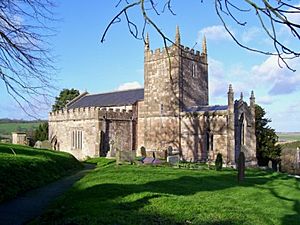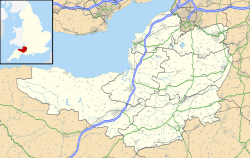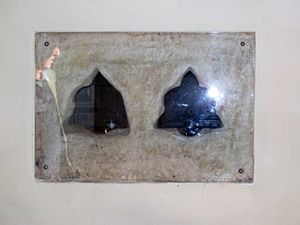St Peter's Church, Englishcombe facts for kids
Quick facts for kids Church of St Peter, Englishcombe |
|
|---|---|

St Peter's church seen from the southeast
|
|
| 51°21′50″N 2°24′31″W / 51.36389°N 2.40861°W | |
| Location | Englishcombe, Somerset |
| Country | England |
| Denomination | Church of England |
| History | |
| Founded | 12th century |
| Dedication | Saint Peter |
| Architecture | |
| Heritage designation | Grade I Listed |
| Designated | 1 February 1956 |
| Style | Norman, Decorated, Perpendicular |
| Administration | |
| Diocese | Bath and Wells |
| Province | Canterbury |
The Church of St Peter is a special old church in Englishcombe, Somerset, England. It belongs to the Church of England. This church is so important that it's called a Grade I listed building. This means it's one of the most historic and protected buildings in the country.
Contents
A Look Back in Time: The Church's History
When Was St Peter's Church Built?
St Peter's Church was likely built a very long time ago, in the 12th century. That's over 800 years ago! It was probably built for a person named Robert de Gournay.
Who Owned the Church?
In 1112, a lady named Hawisia de Gournay gave the church to a group of monks. These monks were part of a special religious order called the Cluniac Priory of Bermondsey. Later, in 1239, the church was given to another group of monks in Bath.
Cool Features of the Church
Norman Style and Special Holes
The church has some really old parts built in a style called Norman. You can see this in the rounded arches. There are also some interesting openings in the porch called "leper holes." These holes allowed people with leprosy, a skin condition, to listen to the church service. They could hear the sermon without being too close to other people.
Stone Carvings and Designs
Inside the church, on both sides of the main area called the chancel, you can see special stone carvings. These are called "corbel tables." They show pictures of animals and people. It's like a little art gallery carved right into the stone!
More About the Church
The Church Today
Today, St Peter's Church is part of a larger group of churches. It works together with St Barnabas in Bath. This helps them serve the local community.
See Also
- Grade I listed buildings in Bath and North East Somerset
- List of Somerset towers
- List of ecclesiastical parishes in the Diocese of Bath and Wells



